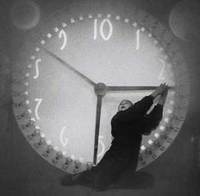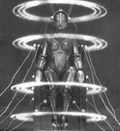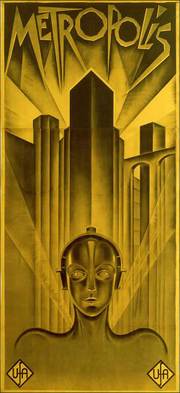 If you consider yourself a science fiction movie fan, and have never heard of Fritz Lang’s Metropolis, then you are no science fiction movie fan.
If you consider yourself a science fiction movie fan, and have never heard of Fritz Lang’s Metropolis, then you are no science fiction movie fan.
Metropolis is widely-considered the first serious science fiction film (the Georges Méliès’ 1902 short A Trip to the Moon cannot be considered high science fiction), and most science fiction classics, from Blade Runner to Star Wars to The Matrix all are derived, whether they realize it or not, from this 1927 German work.
At the time is was made, Metropolis was the most expensive silent film of the time, costing approximately 7 million Reichsmark (equivalent, by some estimate to about $200 million U.S. dollars) to make.
The movie is a strange mixture of political speculation political parable, apocalyptic fantasy, and religious allegory.
Basically, the film is set in the year 2026, a world marked by extraordinary Gothic skyscrapers of a corporate city-state, known as Metropolis. Set designer Erich Kettlehut’s designs for the city Golden Age science fiction, with a characteristically pre-Nazi German architectural flavor.
The society of Metropolis has been divided into two rigid groups: one of planners or thinkers, who live high above the earth in luxury, and another of workers who live underground toiling to sustain the lives of the privileged. The city is run by Johann ‘Joh’ Fredersen (Alfred Abel).
The beautiful and evangelical figure Maria (Brigitte Helm — who was 17 when the film was made) takes up the cause of the workers. She advises the desperate workers not to start a revolution, and instead wait for the arrival of "The Mediator", who, she says, will unite the two halves of society.
 The son of Joh, Freder (Gustav Fröhlich), becomes infatuated with Maria, and follows her down into the working underworld. In the underworld, he experiences firsthand the toiling lifestyle of the workers, and observes the casual attitude of their employers (he is disgusted after seeing an explosion at the "M-Machine", when the employers bring in new workers to keep the machine running before taking care of the men wounded or killed in the accident). Shocked at the workers’ living conditions, he joins her cause.
The son of Joh, Freder (Gustav Fröhlich), becomes infatuated with Maria, and follows her down into the working underworld. In the underworld, he experiences firsthand the toiling lifestyle of the workers, and observes the casual attitude of their employers (he is disgusted after seeing an explosion at the "M-Machine", when the employers bring in new workers to keep the machine running before taking care of the men wounded or killed in the accident). Shocked at the workers’ living conditions, he joins her cause.
Meanwhile Freder’s father, Joh, consults with a scientist named Rotwang (Rudolf Klein-Rogge). Rotwang is an old companion and rival of Joh. Years ago we learn, they both pursued a woman named Hel. Joe won over Hel and went on to run Metropolis, while Rotwang languished in anonymity. Hel, we learn, died while giving birth to Freder.
From Rotwang, Joh learns that the papers found with dead workers are plans of the catacombs and witnesses a speech by Maria. Maria has given the workers hope by preaching about the coming of a "mediator" who would be the "heart" between the "head" (i.e., Joh, the conceiver of the city) and the "hands" (or the people who labor to make it a reality).
Joh also learns that Rotwang has built a femaile robot. Rotwang wants to give the robot the appearance of Hel, his former lover who left him for Joh and died giving birth to Freder. Joh persuades him instead to give the robot Maria’s appearance, as he wants to use the robot to tighten his control over the workers. Rotwang complies out of ulterior motives: he knows of Freder’s and Maria’s love and wants to use the robot to deprive Joh of his son.
 To complete the transformation of his robot, Rotwang enters the catacombs and captures Maria. Maria is imprisoned in Rotwang’s house in Metropolis, while the now-transformed robot Maria is first showcast as an exotic dancer in the upper city’s Yoshiwara nightclub, fomenting discord among the rich young men of Metropolis.
To complete the transformation of his robot, Rotwang enters the catacombs and captures Maria. Maria is imprisoned in Rotwang’s house in Metropolis, while the now-transformed robot Maria is first showcast as an exotic dancer in the upper city’s Yoshiwara nightclub, fomenting discord among the rich young men of Metropolis.
Freder catches his father and the mechanical Maria together, is shocked into sickness and hallucinations.
Eventually, Rotwang relents, he wants to back out of the plan. He and Joh fight; Rotwang is knocked unconscious while Maria escapes. She runs to the underground city which is now deserted, except for its children; the workers, in full revolt under the robot’s leadership, are demolishing machinery—some of which controls reservoirs above.
After descending to the worker’s city, the robot Maria encourages the workers into a full-scale rebellion, and they destroy the "Heart Machine", the power station of the city. Neither Freder nor Grot, the foreman of the Heart Machine, can stop them. As the machine is destroyed, the city’s reservoirs overflow, flooding the workers’ underground city and seemingly drowning the children, who were left behind in the riot.
But the children have not drowned. Freder and Maria have saved them in a heroic rescue, without the workers’ knowledge. (It’s not clear how Freder showed up after his hallucinations; much of this part of the print as been lost — more on that below)
When the workers realize the damage they have done and that their children are lost, they attack the upper city. Under the leadership of Grot, they chase the human Maria, whom they hold responsible for their riot. As they break into the city’s entertainment district, they run into the Yoshiwara crowd and capture the robot Maria, while the human Maria manages to escape. The workers burn the captured (robot) Maria at the stake; Freder, believing this to be the human Maria, despairs.
But then he and the workers realize that the burned Maria is in fact a robot.
Meanwhile, the human Maria is chased by Rotwang along the battlements of the city’s cathedral. Freder chases after Rotwang, resulting in a climactic scene in which Joh watches in terror as his son struggles with Rotwang on the cathedral’s roof. Rotwang falls to his death, and Maria and Freder return to the street, where Freder unites Joh (the "head") and Grot (the "hands"), fulfilling his role as the "Mediator" (the "heart").
That’s it in a nutshell. Here’s a montage of scenes from the original film, so you can get a sense, if nothing else, of its style.
The appeal of Metropolis comes as a piece of film history, not as a film itself. Lang’s cut of Metropolis premiered in Berlin at more than three and a half hours; the studio cut it drastically soon after its release (almost in half), and much of the cut material has been thought to be lost for good. Over the years different versions of the film exhibiting varying degrees of quality have circulated (often with new soundtracks), with some versions coming in at less than 90 minutes. [When discussing the running time of Metropolis – the original or subsequent versions – one must use caution; nobody can agree on what speed the film was intended to be shown at, and that makes a difference]
So the problem, you see, is that there are so many cuts of the film, that even my above plot synopsis may not be accurate… and certainly not complete. Many of the cuts made over the years are simply baffling: the entire subplot concerning the man Fredersen sends to spy on his son; the scenes explaining the origin of Rotwang’s enmity toward the city’s ruler; and the struggle between the rival geniuses that allows the real Maria to escape from Rotwang’s clutches.
This makes Metropolis an excruciating film to watch. The half-explained plot twists (in incomplete versions), plus the very non-Hollywood style of story-telling, coupled with religious and iconic imagery, all combine to send the typical viewer into fits of apoplexy, as they wonder aloud "WTF am I watching?!?" I suspect that even without cuts, the film is pretty inaccessible (but at least, one hopes, there aren’t gaps).
I happen to own four DVDs of the movie. Why four?
Well, the first one I bought shortly after DVDs came out. Cost a couple of bucks. It’s a scratchy, public domain version.
The second one I bought was a "restored" version. Pretty much the same as my earlier version, but cleaner. With 1927 orchestrations played by a contemporary orchestra.
The third version I bought was the 1984 "restoration" of Metropolis, a re-edit of the film that was compiled by Giorgio Moroder. Moroder’s version of the film introduced a new modern rock-and-roll soundtrack for the film. Although it restored a number of previously missing scenes and plot details from the original release, his version of the film runs to only 80 minutes in length. The 1984 re-edit also attempted to fill in plot gaps by using publicity still photos from the original Lang movie to create montages. Morodor also used color overlays for different scenes, getting away from the black & white/sepia look. Here’s a clip:
I can’t say that the I enjoyed the Morodor remake very much. The pop soundtrack was bizarre. The whole thing still suffered from being uneven. But it was, well, interesting.
Finally, the 4th version I bought was a recent re-release by Kino, containing recently discovered footage, a documentary, and some film historians guessing at the plot holes based on archival material (still photos, working scripts, etc.). It is the most definitive version — the closest to the original — that has been mass-marketed to date.
FYI: Metropolis was also adapted to a stage musical which took the theme and story of "Metropolis"> It was produced as a contemporary piece, while suggesting much of the mood of the original 1920’s vision of the future. From what I understand, it was not well-received.
OKAY. SO WHY AM I TALKING ABOUT METROPOLIS?
Because of the news, which, I confess, I cannot believe I missed a few weeks ago. Earlier this month, they found what appears to be the full uncut original as intended by Fritz Lang:
A long-lost original cut of the classic sci-fi film Metropolis, with extra scenes, has recently been unearthed and screened for the first time in decades.
Bad journalistic writing here. If it’s the original, then those scenes aren’t "extra". Know what I mean?
The original version of the 1927 film by Austrian-born director Fritz Lang was parked for 80 years, first in a private collection and then at the Museum of Cinema in Buenos Aires. That’s where it was re-discovered in April with images that hadn’t been seen since 1927.
"We no longer believed we’d see this. Time and again we had had calls about supposed footage but were disappointed," said Helmut Possmann, head of the Friedrich Wilhelm Murnau Foundation in Wiesbaden, Germany, which owns the rights to to the film.
Possmann said up to 25 minutes of extra scenes help flesh out secondary characters as well as the plot.
The cinema museum’s director, Paula Felix-Didier, said theirs is the only copy of Lang’s complete film and it is being guarded very carefully.
***
The cinema museum’s director, Paula Felix-Didier, said theirs is the only copy of Lang’s complete film and it is being guarded very carefully.
Metropolis was written by Lang and his actress wife, Thea von Harbou.
The film depicts a 21st-century dystopic world split into a class of underworld workers and an elite who control them.
Soon after its initial release, distributors cut Lang’s masterpiece into a 114-minute version.
According to Felix-Didier, a private collector carried an original version to Argentina in 1928.
In the 1980s, Argentine film fan Fernando Pena heard rumours about a man who used to spend hours screening a version of Metropolis.
It took many years of begging by Pena, but employees at the Buenos Aires museum finally decided to check their archives this year to see whether they had a version of the film. In April, researchers uncovered the reels in the museum’s archive.
In June, Felix-Didier carried a DVD copy of the long version to the Murnau foundation in Germany, where researchers confirmed its authenticity.
As for a cinematic distribution, it’s too soon to say whether the original will be re-issued.
No, I expect it won’t be released theatrically. Maybe at museums. But I would like to see that sucker on DVD.
The BBC adds this:
Around 20 to 25 minutes of footage that fleshes out secondary characters and sheds light on the plot would be added to the film pending restoration, Possmann said, but around 5 minutes of the original was probably still missing.
Eh… five minutes? I’ll live.
[FYI: What’s my real interest in Metropolis? I have a confession. I’ve been working on a stage musical version of this — for grins and giggles — for a number of years. Employing the discography of The Thompson Twins which, remarkably, fits in stylistically and lyrically with the plot. Don’t tell anybody.]

